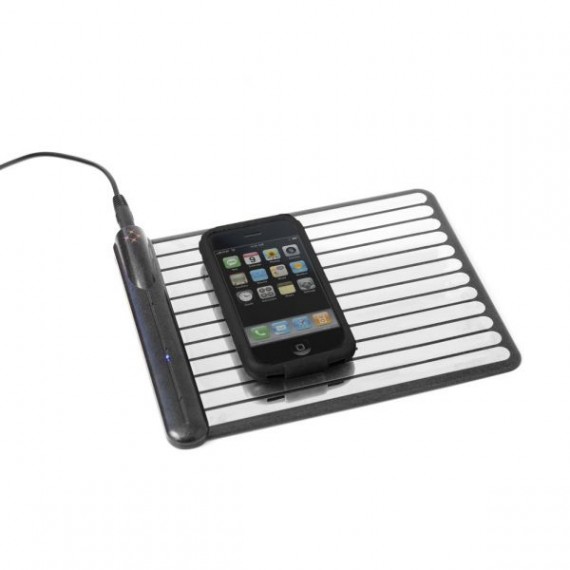
The reason we’re looking at BTS200 and xqBeats together is that they’re both designed to serve the same basic purpose at very similar price points. Each unit pairs two small speakers with a Bluetooth 2.1 wireless chip, a microphone, and a rechargeable battery. They operate wirelessly from 30-foot distances from your iOS device, and have 3.5mm aux-in ports if you prefer to use them in wired mode, assuming you self-supply the audio cable. That’s not really why they’re here, though. Uniden positions BTS200 as a wireless desktop speakerphone that can also be used on the road—and as an iPhone or iPod touch charger. unlike any similar speaker we’ve seen, BTS200’s 2950mAh battery is detachable and has its own side-mounted USB port; you can use the battery to power BTS200 for up to seven hours, recharge an iPhone nearly two times, or use both features at the same time with reduced power for each device.
Though both Uniden and Strax refer to these little speaker systems as offering “HD” audio, the truth is that neither one is particularly powerful or sonically impressive. BTS200 makes the most of a 4-Watt amplifier and twin 50mm up-firing speakers by using SRS WOW HD audio technology, which is designed to squeeze superior sonic performance out of modest audio hardware. Both systems sound pretty flat, but BTS200’s renditions of songs have a little more body and dynamic range; its speakers can also be turned up quite a bit louder than “safe for close listening,” albeit with increasing distortion. when we used BTS200 in speakerphone mode, callers told us that the microphone sounded nearly as good as the one in the iPhone 4—with extra gain but also a little clipping—but there was no question that we could hear them more clearly than through the iPhone’s bottom speaker. Pairing was also easy.
xqBeats claims to be using a more powerful 6-Watt amplifier, but in practice, its audio was quieter and less defined than BTS200’s. while the volume level was louder than the integrated speakers in iPhones, iPads, and iPod touches, the difference wasn’t as profound as with the Uniden unit, and the audio was similarly flat, with very little midrange detail and no particular advantage in treble or bass over the BTS200, either. Like BTS200, xqBeats is not capable of filling even a small room, but it is adequate for letting you hear music or phone calls considerably more loudly than through any iPhone, iPod touch, or iPad integrated speaker. on the other hand, callers complained consistently about audio issues during iPhone calls made with xqBeats, citing a persistent hum or buzz in the background and distant-sounding audio. They urged us to get off the speakerphone when we were using xqBeats, which is never a good sign.
Yet where xqBeats really fell short of BTS200 in our testing was in the interface department. Strax chose to use a capacitive touch panel for volume, track, power, and call/play/pause buttons, and “a mess” would the easiest way that we can describe the experience of using it. The buttons illuminate only briefly when the unit’s turned on, then blend invisibly into the jet black top surface, and you’ll need to fumble around a little to reactivate their red lights and see them again. Even turning xqBeats on and off was a pain; moreover, a lock switch in the back needs to be engaged so the buttons aren’t inadvertently activated in a bag. BTS200’s buttons have their own issues—there aren’t any track controls, and though you get dedicated mute and phone buttons, iPhone and iPod touch voice control isn’t obviously accessible—but at least they’re easy to see and figure out.
Despite their similar prices, the overall experiences offered by BTS200 and xqBeats are pretty different, and Uniden wins in almost every category. BTS200 isn’t a purely awesome-sounding little speaker, nor is it the littlest portable Bluetooth speaker we’ve tested, but it sells for around half the retail price of the Soundmatters foxL v2.2 and offers better functionality and performance, besides: the speakers and speakerphone functionality work well, as does the integrated portable charger. It’s good enough to merit a B+ overall rating because of the value it delivers for $120; business users and frequent travelers will find it to be a handy accessory. by comparison, xqBeats falls well short of being recommendable. It’s a sonic disappointment, particularly on the microphone side, and between its problematic microphone performance and weak touch controls, we didn’t enjoy turning it on or using it. The idea is noble and the pricing wouldn’t be offensive if it worked well, but it’s only a decent sound system for the price. xqBeats is worthy of a C-, and then only because of the clean, compact design.